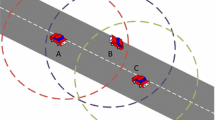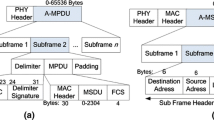Optimization of IEEE 802.11e MAC protocol performance is addressed by modifying several parameters left open in the standard, like block size and acknowledgement policies in order to improve the channel efficiency. The use of small block sizes leads to a high overhead caused by the negotiation on the other hand, the use of large block sizes causes long delays, which can affect negatively real-time applications (or delay sensitive applications). An event driven simulator was developed, and results with a single service and several services running simultaneously were extracted. By using the Block Acknowledgement (BA) procedure, for video and background traffics in a single service situation, the capacity was improved in the case when the number of stations is equal or higher than 16 and 12, respectively. However, for lower values of the number of stations, the use of BA leads to a slightly worst system performance. In a scenario with mixture of services the most advised block size is 12 (less delay in a highly loaded scenario). The number of supported user (total) increases from 30 to 35.
Access this chapter
Tax calculation will be finalised at checkout
Purchases are for personal use only
Preview
Unable to display preview. Download preview PDF.
Similar content being viewed by others
References
A. R. Prasad, and N. R. Prasad, (2005). 802.11 WLANs and IP Networking. Artech House, Boston, MA.
J. L. Mukerjee, R. ă Dillinger, M. ăMohyeldin and Schulz, E.ă (2003). Investigation of radio resource scheduling in wlans coupled with 3g cellular network. IEEE Communications Magazine, 41(6):108–115.
T. Li, Q. Ni, T. Turletti and Y. Xiao, (2005). Performance analysis of the ieee 802.11e block ack scheme in a noisy channel. In IEEE BroadNets 2005 — The Second International Conference on Broadband Networks, Boston, MA.
T. Li, Q. Ni and Y. Xiao, (2006). Investigation of the block ack scheme in wireless ad-hoc networks. Wiley jornal of Wireless Communications and Mobile Computing, 6(6):877–888.
I. Tinnirello, and S. Choi, (2005). Efficiency analysis of burst transmissions with block ack in contention-based 802.11e wlans. In ICC 2005 — IEEE International Conference on Communications, Seoul, Korea.
V. Scarpa, G. Convertino, S. Oliva and C. Parata, (2005). Advanced scheduling and link adaptation techniques for block acknowledgement. In 7th IFIP International Conference on Mobile and Wireless Communications Networks (MWCN 2005), Marrakech, Morocco.
Ni, Quiang (2005). Performance analysis and enhancements for ieee 802.11e wireless networks. IEEE Networks, 19(4):21–27.
A. Grilo, (2004). Quality of Service in IP-based WLANs. Ph.D. thesis, Instituto Superior Tcnico, Technical University of Lisbon, Lisbon, Portugal.
O. Cabral, A. Segarra and F. J. Velez, (2008). Event-driven simulation for ieee 802.11e optimization. IAENG International Journal of Computer Science, 35(1):161–173.
Author information
Authors and Affiliations
Editor information
Editors and Affiliations
Rights and permissions
Copyright information
© 2009 Springer Science+Business Media B.V
About this chapter
Cite this chapter
Cabral, O., Segarra, A., Velez, F.J. (2009). IEEE 802.11E Block Acknowledgement Policies. In: Ao, SI., Gelman, L. (eds) Advances in Electrical Engineering and Computational Science. Lecture Notes in Electrical Engineering, vol 39. Springer, Dordrecht. https://doi.org/10.1007/978-90-481-2311-7_20
Download citation
DOI: https://doi.org/10.1007/978-90-481-2311-7_20
Publisher Name: Springer, Dordrecht
Print ISBN: 978-90-481-2310-0
Online ISBN: 978-90-481-2311-7
eBook Packages: EngineeringEngineering (R0)




